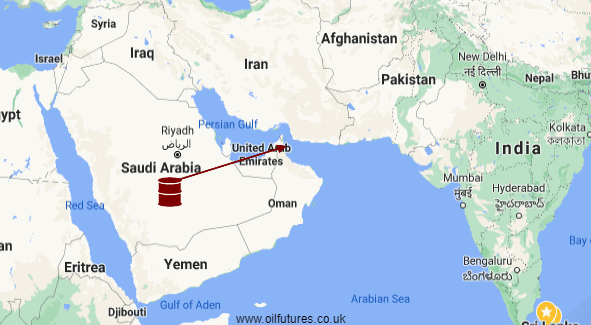The disagreement between Saudi Arabia and India over
the production cuts of crude oil took yet another twist today when the former
increased the price of oil, known as OSP, the official selling price, for Asia
while bringing it down for the US and Western Europe.
The main customer block for Saudi Arabia has been in
Asia for years; yet the price hike comes at a time when the region is
struggling to cope with the multitude of consequences due to the pandemic; in
addition, there are signs that the region may slide into a third wave of the
pandemic.
The kingdom, however, does not seem to be looking at
the economic prospects of the region from the pandemic perspective. On the
contrary, it sees the potential for growth in the region outweighs the
hypothetical inhibitions against the same.
Aramco, the world’s largest oil company that is owned
by the Saudi government, plans to increase all grades of crude for Asia by 20 –
50 cents from May.
The price of all grades to Western Europe will
remain unchanged whereas the Arab light for the region will be reduced by 20
cents. Most grades of oil for the US, meanwhile, will be down by 20 cents.
Although Saudi oil minister insisted that the
unexpected phone conversation with his US counterpart on the eve of the recent
OPEC+ meeting, it’s clear that the conversation has produced something in
favour of the US interests.
As for India, the price hike is major blow, both diplomatically
and economically; it will cause reverberations across the political domain too.
Indian oil minister has been vehemently opposing the
production cuts for months and even issued thinly-veiled threats that they
would look for alternatives elsewhere.
Having been true to his words, in February, the US
became the second biggest crude oil exporter to the world’s third largest
consumer.
Turning its back on the Middle East suppliers,
especially Saudi Arabia, however, is easier said than done: the combination of the
proximity, shipping cost and above all, the reliability of consistent supply
still makes the Middle East as the best option for India as far as its crude
oil imports are concerned.
In this context, it’s interests of both countries
that up until the oil issue came up, used to enjoy mutually beneficial
pragmatic relations, to tone down the war of words at ministerial level. It certainly
is good for the region too for various reasons, as volatility in any form is in
no one’s interest.







